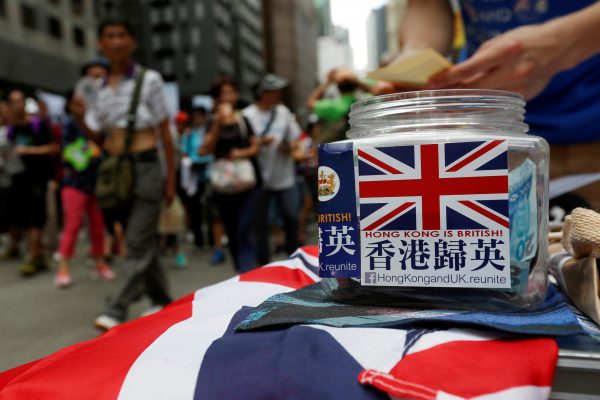It is often suggested that London is too soft on Hong Kong due to its desire for better economic relations with China. But a detailed look at the development of the UK’s Hong Kong policy reveals a more complex picture.
To be sure, the UK’s broader relations with China have always informed its policy towards Hong Kong — both before the 1997 handover of sovereignty and since. But London’s approach to Hong Kong since 1997 is more in line with the ‘high degree of autonomy’ that the Hong Kong Special Administrative Region (SAR) enjoys under the ‘one country, two systems’ formula.
This autonomy is reflected in institutional arrangements. Unlike in most British consulates, the UK’s chief diplomat in Hong Kong — the Consul-General — does not report to the Ambassador in Beijing, but directly to London.
Further, the bilateral relationship between Hong Kong and the UK is a significant one in its own right. According to the UK’s foreign ministry, UK investment in Hong Kong accounts for around one third of total UK investment across Asia. Hong Kong investment in the UK has been growing and there are deep educational links between the two. London and Hong Kong also share a strong connection as major financial centres.
These linkages are clearly not divorced from wider UK–China ties: a significant proportion of British commercial engagement with Hong Kong is part of its broader engagement across China. But they do reveal dynamics to UK–Hong Kong relations that are not simply derived from the UK’s wider approach to China.
Following the UK’s June 2016 referendum vote to leave the European Union, early indications are that the government is nurturing not just relations with China, but also with Hong Kong.
How do these factors play into Britain’s response to Hong Kong’s turbulent political environment of late? What is the UK government’s opinion on the Occupy Movement of 2014, the subsequent rejection of the government’s proposals for political reform and the emergence of a nascent independence movement in the SAR?
There is no simple answer. London’s positioning on these issues reflects a delicate balancing act between several factors. The UK’s long-standing approach has been to support gradual democratisation, reflected in the agreements and understandings from the 1980s and 1990s to which London was a party. But it has had to balance this approach with the pressures from Hong Kong’s contested political landscape, in particular the breakdown of consensus on gradual democratisation in Hong Kong amid vocal demands for democratic development which go beyond the provisions of Hong Kong’s Basic Law and, by implication, go beyond the UK’s longstanding position.
Getting the right language to respond to these developments is challenging. As the latest Foreign and Commonwealth Office (FCO) report to Parliament shows, the UK’s public statements tend to reflect more the views of critics than those of the Hong Kong government.
Contested developments in Hong Kong have also fed back into British politics. For instance, in 2014 there was a parliamentary inquiry into British policy towards Hong Kong which was critical of the FCO for being too timid in its judgments.
As for Hong Kong’s independence movement, London’s view has gradually become clear: it sees independence as ‘impractical’ and not in Hong Kong’s interests. But behind this is the message that it is not in British interests either. These are better served by continuity and stability in Hong Kong as set out in the ‘one country, two systems’ framework.
Underlying these dynamics is a tension between the UK as an idealistic ‘moral leader’ seeking to support the dissemination of democratic and liberal values, and as a pragmatic actor balancing competing British interests and commitments. This balancing act will continue, but become increasingly challenging if — as looks likely — contestation in Hong Kong politics continues to deepen.
Tim Summers is an Adjunct Assistant Professor at the Centre for China Studies, The Chinese University of Hong Kong and a Senior Consulting Fellow on the Asia Programme at Chatham House.
His recent paper British Policy towards Hong Kong and its Political Reform appears in Issues & Studies (2017). You can follow him on Twitter at @tasumm.

